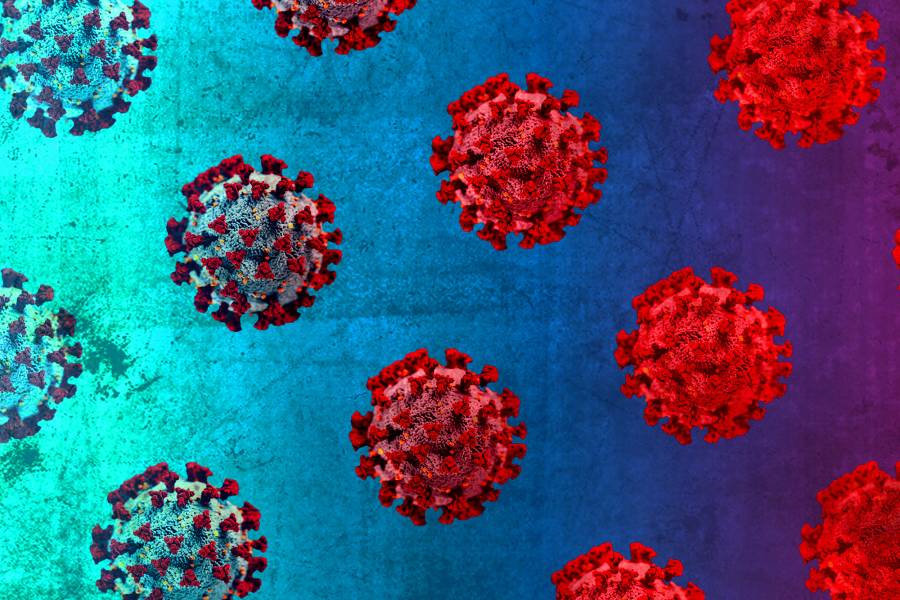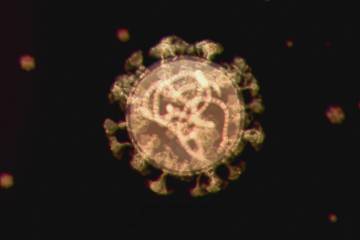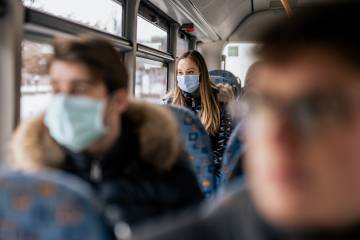It's still too soon to have definitive answers to some big questions about omicron, labeled in late November by the World Health Organization as a COVID-19 variant of concern. On Dec. 7, the Bloomberg School of Public Health's podcast, Public Health On Call, shared what we know so far with a conversation between host and director of the Bloomberg American Health Initiative Josh Sharfstein, who is also vice dean for public health practice and community engagement, and virologist Andrew Pekosz, a professor of molecular microbiology and immunology.
Listen to the conversation or read the edited transcript below.
What do we know about omicron from the last week?
One thing that's becoming very clear, with data out of South Africa and parts of Europe in particular, is that this virus really is spreading quite effectively in populations. It's spreading in two different kinds of scenarios. In South Africa, there are low numbers of COVID-19 cases, and [omicron] seems to have sparked a surge of cases in many provinces there. In Europe, where delta was already well established, it's spreading at a rate that's equal to delta, if not higher.
What do we know about its ability to transmit among people who've had a prior COVID-19 infection or have been vaccinated?
The data is primarily driven by South Africa, but we're also seeing evidence in the travel-associated cases, that a large number of individuals who are omicron-infected have been vaccinated or have also received their booster vaccine.
In South Africa, an analysis of their initial cases showed that the risk of reinfection with omicron is almost three times greater than it was with previous variants, including the beta and delta variants.
It does seem that this virus is able to evade some of the vaccine-induced and infection-induced immune responses and establish an infection.
That is not great news. Does this mean we'll see more infections from this variant in the near future around the world?
I think that's probably true. We're waiting for the data on disease severity, which lags behind reporting of cases. It takes about 10 to 14 days before people develop a severe form of COVID-19.
This week and next week, we'll start to see data on hospitalization rates, and we'll be able to see how those hospitalization rates are moving with respect to case rates in different countries. One positive aspect is that South Africa is continuing to provide data at an incredibly fast rate. Several reports from South Africa suggest that the disease they're seeing is relatively mild. We'll need more data to confirm that, but that's one good thing that's coming from the data in the last week.
I've seen some reports that show patients aren't as likely to need oxygen or don't spend as long in the hospital as with previous cases. Is that what you're referring to?
Absolutely. One report from South Africa found several cases of the omicron variant within hospitals, but those patients were already being hospitalized [for other health issues], not because they were showing the typical signs of severe COVID-19 that South African hospitals have seen previously.
Many parts of the world are going to be reporting data faster than we'll see in the U.S. That's because they have this particular PCR test that gives a signature that is apparently very omicron-specific. It's not a specific PCR test for omicron, but the signature omicron gives is unique to [that test]. So we'll see some of that data coming out faster from other parts of the world because they don't have to rely on [genetic] sequencing of viruses to confirm an omicron infection.
What's the status right now of this variant in the United States?
We're seeing many travel-associated cases and their significant community spread. We're seeing several reports of what we call superspreader events, meaning one individual has infected many other individuals at one event. Spread and transmission can occur quite efficiently with this variant, just like we saw with delta and alpha.
I know there have been some plans to study the antibodies generated by the vaccine against [omicron]. What's the status of those studies?
Several of the vaccine manufacturers have been able to generate what's called a pseudo-neutralization assay, where they put the spike protein of the variants into a different virus, and that allows them to quickly assess antibody reactivity data. We don't know the results yet, but we know that those studies are ongoing.
Also see
I [also] know of a dozen laboratories that are trying to isolate the virus and distribute it—both nationally and globally—so that we can study more aspects of the virus itself.
What results can we expect from these neutralization assays? Will we find that the response is different for omicron compared to delta?
Based on the sequence, I would certainly expect that this virus will evade some of the vaccine- or infection-induced antibody responses, but it won't eliminate all of it. It'll be really important for us to understand, if [omicron] doesn't induce severe disease, what aspect of that vaccine-induced immune response is providing some level of protection.
We've seen with the delta variant that the vaccines can protect against severe disease much better than they can protect against infection. We're hoping to see the same thing happen with omicron—where antibody responses that would normally protect from infection [might] be a little bit reduced, but the ones protecting from severe disease will be maintained. That's the ideal scenario and the one that I would expect to see, given data with other viruses like influenza.











